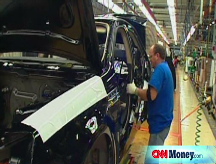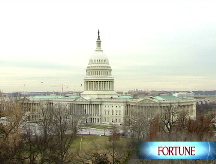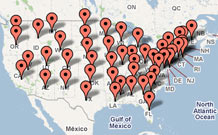 |
| A Toyota engine plant in Alabama. |
Why Toyota wants GM to be saved
A GM failure would cause production problems, crush already weak demand and potentially open the door to low-cost competitors.
NEW YORK (CNNMoney.com) -- Detroit's Big Three aren't the only automotive companies that want to see the government step in with some much needed financial help.
Overseas automakers, most notably Toyota Motor, all endorse some form of federal aid to keep General Motors (GM, Fortune 500), Chrysler LLC and possibly Ford Motor (F, Fortune 500) out of bankruptcy.
GM has warned it will run out of cash for operations by the end of this year without federal help, and Chrysler is not far behind. Ford has more cash on hand than its U.S. rivals but has said it could need federal loans if the auto market does not improve.
The Senate killed an effort to get the automakers a stopgap loan last week and now the Bush administration has said it is looking at providing the automakers help from the $700 billion approved to bailout banks and Wall Street firms.
"We support measures to help the industry," said Toyota Motor (TM) spokeswoman Mira Sleilati. "We just want a strong, competitive healthy industry."
This may seem surprising at first, especially when you consider that much of the opposition to the auto bailout was from senators from Southern states home to auto plants operated by Asian auto companies, such as Alabama and South Carolina. But the Asian automakers insist they never lobbied against such help for the Big Three.
And this makes sense once you take a closer look at the dynamics of the auto industry and how intertwined the fates of all the companies are. Here's why Toyota, Honda Motor (HMC) and other Asian auto manufacturers clearly believe they are all better off with GM and Chrysler surviving than if they go out of business.
The overseas automakers, who between them produce more than 3 million vehicles a year at U.S. plants, all worry their production would be hurt by if one of the U.S. automakers went under. That's because a Big Three failure would likely lead to widespread bankruptcies in the auto parts supplier industry.
Erich Merkle, lead auto analyst with the consulting firm Crowe Horwath LLP said there is much overlap between the automakers' suppliers. Since most parts in an automobile have only a single supplier producing them, the disruptions in production will be severe and prolonged.
"It could take months for a Toyota to work through that and resume normal production," he said.
Merkle said the current network of auto suppliers, manufacturers and dealerships have worked well for the overseas automakers, who have posted steady gains in their U.S. market share during the past few years.
Besides sharing suppliers, many dealers sell both U.S. and overseas brands. So the failure of a U.S. automaker could hurt the overseas manufacturers' dealer network and their sales as well, Merkle said.
"There would be a severe disturbance in the force," he quipped.
A collapse of one of the Big Three would also probably cause an even more severe hit to the U.S. economy. That would further eat into demand for U.S. auto sales, which hit a 26-year low in November.
"The U.S. economy would be in shambles," Merkle said. "The robust U.S. economy that Toyota and the others depend on would suddenly not be as lucrative."
The overseas automakers agree that the last thing they need is for the U.S. economy to slow further. The U.S. is the largest market for Toyota, Honda and Nissan (NSANY). All are expected to report lower U.S. sales this year for the first time ever.
"We want to get the economy back," said Michael Stanton, CEO of the Association of International Automobile Manufacturers, which represents most of the Asian automakers with plants in the U.S. "Everyone is hurting at this level of sales. Everybody is either cutting back or shutting down."
The latest cutbacks came Monday when Toyota announced it was putting plans to open a new plant in Mississippi on hold indefinitely, even though it is about 90% complete. The plant was set to start building the first domestically-produced Prius in 2011.
While the overseas automakers would be certain to eventually pick up more U.S. market share if a U.S. automaker stopped doing business, Merkle said the need to sell off the inventory of the failed automaker at fire sale prices would depress all prices in the industry in the short-term.
The final concern for the overseas automakers is a longer-term problem. If a U.S. automaker fails, that could open the door for a Chinese or Indian automaker to buy up the assets of the failed automaker and create a new low-cost competitor in the U.S.
"You could open the door for foreign companies to buy distressed assets at rock bottom prices," he said. He pointed to India's Tata (TTM) and China's Geely, as two automakers in the developing world that are already on record as being interested in expanding into western markets like the United States.
"Tata and Geely would be incredibly open to brownfield sites," he said, referring to the term used to describe companies that buy discarded industrial facilities.
Toyota and Honda have already felt the effects of competition from other upstarts firsthand in the U.S.
Korean manufacturers Hyundai and Kia have eaten into the sales of Toyota's and Honda's small, inexpensive vehicles, but that growth has taken decades.
Merkle said it might take a year or more for a new competitor to get off the ground. But by grabbing U.S. automakers' assets, vehicle designs and dealerships, an incoming Indian or Chinese manufacturer could quickly become a low-cost threat much quicker than the Koreans.
The established automakers like Toyota and Honda are also unlikely to look to buy the distressed assets themselves because they have never used acquisitions or purchases of other companies' assets as a method of growing.
Instead, they have always built their own facilities from the ground up in order to expand. Merkle said that is unlikely to change, even if the more productive facilities of U.S. automakers were put up for sale by a bankruptcy court, Merkle said.
While companies such as Tata or Geely are likely to eventually enter the U.S. anyway, Merkle said the vacuum caused by the failure of GM or Chrysler could jumpstart those efforts and bring them to the market years earlier than expected. ![]()



1 comment:
This is helpful. Thanks for sharing this post.
Leave sooner, drive slower, live longer.
Used Lexus Atlanta | Pre Owned Lexus
Post a Comment